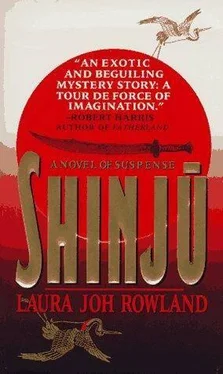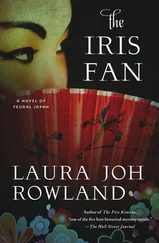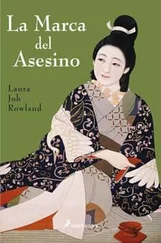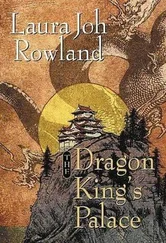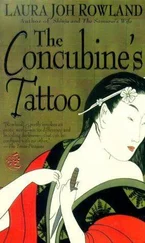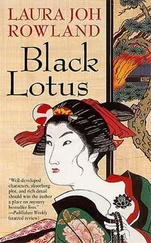Laura Rowland - Shinjū
Здесь есть возможность читать онлайн «Laura Rowland - Shinjū» весь текст электронной книги совершенно бесплатно (целиком полную версию без сокращений). В некоторых случаях можно слушать аудио, скачать через торрент в формате fb2 и присутствует краткое содержание. Жанр: Исторический детектив, на английском языке. Описание произведения, (предисловие) а так же отзывы посетителей доступны на портале библиотеки ЛибКат.
- Название:Shinjū
- Автор:
- Жанр:
- Год:неизвестен
- ISBN:нет данных
- Рейтинг книги:4 / 5. Голосов: 1
-
Избранное:Добавить в избранное
- Отзывы:
-
Ваша оценка:
- 80
- 1
- 2
- 3
- 4
- 5
Shinjū: краткое содержание, описание и аннотация
Предлагаем к чтению аннотацию, описание, краткое содержание или предисловие (зависит от того, что написал сам автор книги «Shinjū»). Если вы не нашли необходимую информацию о книге — напишите в комментариях, мы постараемся отыскать её.
Shinjū — читать онлайн бесплатно полную книгу (весь текст) целиком
Ниже представлен текст книги, разбитый по страницам. Система сохранения места последней прочитанной страницы, позволяет с удобством читать онлайн бесплатно книгу «Shinjū», без необходимости каждый раз заново искать на чём Вы остановились. Поставьте закладку, и сможете в любой момент перейти на страницу, на которой закончили чтение.
Интервал:
Закладка:
Then, mercifully, the eta led him outside into the cold, fresh air. They were in another courtyard, this one surrounded by a high bamboo fence. Sano inhaled gratefully.
“The morgue, master.” The eta opened the door of a thatch-roofed building and gestured for him to enter.
Sano hesitated. He feared that whatever awaited him in the morgue would be worse than anything he’d seen yet. But when he stepped inside, there was only a wooden-floored room with cabinets and stone troughs lining the walls, and in the center two waist-high tables with raised sides. A man stood at the open window, his profile to Sano, reading a book by the fading afternoon light. He wore a long dark blue coat, the physician’s traditional uniform, with a gray quilt over his shoulders to ward off the room’s damp chill. He turned. One look at his face sent a shock of recognition through Sano.
The man was perhaps seventy years of age, with a high, bony forehead and prominent cheekbones. A deep furrow ran from either side of his long, ascetic nose to the narrow line of his mouth. He had short white hair that receded at the temples but grew abundantly over the rest of his scalp. His shrewd eyes regarded Sano with displeasure, and he glanced down at his book as if annoyed at the interruption. Sano, following his gaze, also looked at the book. As he moved closer, he saw a drawing of the human body, covered with foreign words.
The foreign book and the man’s distinctive features and uniform identified him to Sano immediately. Ten years ago he had seen this man paraded through Edo ’s streets in disgrace. He had seen that face on the town notice boards and on broadsheets distributed by the news sellers.
“Dr. Ito Genboku!” Sano blurted out. “But I thought-” He stopped, not wanting to offend the doctor with personal remarks.
Fifty years ago, the government had instituted a policy of strict isolation from the outside world. Iemitsu, the third Tokugawa shogun, had wanted to stabilize the country after years of civil war. Fearing that foreign weapons and military aid would allow various daimyo to overthrow his regime, he’d expelled the Portuguese merchants and missionaries and all other foreigners from Japan, and purged the country of all foreign influence. Only the Dutch were allowed trading privileges. Confined to the island of Deshima in Nagasaki Bay, the merchants were guarded day and night, their contact with the Japanese limited to the shogun’s most trusted retainers. To this day, foreign books were banned; anyone caught practicing foreign science faced harsh punishment.
But a clandestine movement had sprung up among intellectuals. Japanese rangakusha -scholars of Dutch learning-procured foreign books on medicine, astronomy, math, physics, botany, geography, and military science through illicit channels. They pursued their forbidden knowledge in secret. Now Sano marveled at finding himself in the presence of the most famous rangakusha , a man whose courage he’d secretly admired, and never forgotten. Dr. Ito Genboku, once physician to the imperial family. Exiled to Enoshima for practicing Dutch medicine and carrying out scientific experiments. What was he doing here?
“Yes, I am Ito Genboku, and no, I never did go to Enoshima,” Dr. Ito said, echoing Sano’s thoughts. He had a dry but pleasant voice. Humor and irony colored it as he added, “Although some would consider my position as custodian of Edo Morgue much worse than exile. No doubt the Tokugawas thought so when they changed the terms of my sentence. However, it has its compensations.” He held up his book. “I can pursue my studies in peace here. No one cares, as long as the morgue operates smoothly.” Then, abruptly: “Who are you, and what do you want?”
As Sano introduced himself and explained why he’d come, he realized that he had not offered the proper greetings to Dr. Ito. Something about Ito made formality seem unnecessary. Perhaps it was Ito’s unusually direct manner, or the fact that his status as a physician placed him outside the rigid class system that defined relations between other men.
“The eta couldn’t tell me anything, so this one brought me to you,” he finished. “Did you see anything to indicate that the deaths were anything but suicide?”
“I’ve not seen the bodies. Regrettably I have been occupied with those who perished in last night’s fire.” Dr. Ito bent a challenging gaze upon Sano. “Perhaps the best way for you to gain knowledge about the deaths would be to exercise your own powers of observation instead of relying on mine. However, Niu Yukiko has already been returned to her family for burial.”
So Magistrate Ogyu hadn’t trusted him entirely after all, Sano thought. He’d issued the return order himself, leaving no room for mistakes or negligence.
“But we still have Noriyoshi’s body,” Ito continued. “Would you like to examine it with me?”
Sano felt trapped. The Shinto tradition in which he’d been raised taught that any contact with death conferred a spiritual pollution. But to admit his fear of defilement to this man would be shameful. His small independent quest for truth and knowledge seemed insignificant beside Ito’s sacrifice.
“Yes, Ito- san,” he answered.
Dr. Ito turned to the eta . “Mura- san ,” he said, using the respectful form of address as he would to any other man, “fetch Noriyoshi’s body.”
Mura left the room. When he returned, the two other eta that Sano had met were with him. Mura held a bundle of cloth, which he gave to Dr. Ito. The others carried a long form shrouded in white cotton; they placed it on one of the tables and began to unwrap it.
“Noriyoshi’s effects,” Ito said, offering the cloth bundle to Sano.
Sano spread the contents on the other table, delaying his first look at the body emerging from the shroud. Wrapped inside the blue trousers and kimono he found one straw sandal.
“A poor man,” Sano remarked, fingering the coarse, cheap material of the clothes. The sandal, heavily worn on the inner heel, could have belonged to any commoner. He sighed. “The Nius would have opposed a marriage between him and Yukiko for that reason alone.” Had he risked Ogyu’s wrath and braved the jail’s horrors for nothing? “Maybe it was a love suicide after all.”
“Perhaps Noriyoshi himself will tell us.” Dr. Ito laid aside his book and walked toward the now-exposed body. Although his posture was upright and authoritative, he moved gingerly. A spasm of pain crossed his face. “You may go now,” he said to the eta who had brought the body. “Mura- san , I’d like you to stay.”
Unable to postpone seeing the body any longer, Sano looked toward the table.
His first sensation was relief. The rigidity that held Noriyoshi’s limbs stiff, his toes pointed straight at the ceiling, and his mouth agape made him resemble a somewhat grotesque doll instead of a man who had once lived and breathed. He bore no resemblance to the mutilated corpses Sano had seen at the public execution grounds, or to the bloated carcasses pulled from the canals after a flood. Dirt and shreds of seaweed clung to his bare skin and his loincloth, but there was no blood and no sign of decay. Curious now, Sano approached the table for a closer look. The deep red bruises circling Noriyoshi’s wrists and ankles caught his attention.
“Burns from the ropes that bound him to Yukiko,” Dr. Ito explained.
Otherwise, Noriyoshi was unmarked. His stomach was paunchy and his face puffy, but his arms and legs were wiry and he had most of his teeth. Before his death, he’d apparently enjoyed at least fair health for a man of forty-odd years. If he had died by any means other than drowning himself, it didn’t show.
Читать дальшеИнтервал:
Закладка:
Похожие книги на «Shinjū»
Представляем Вашему вниманию похожие книги на «Shinjū» списком для выбора. Мы отобрали схожую по названию и смыслу литературу в надежде предоставить читателям больше вариантов отыскать новые, интересные, ещё непрочитанные произведения.
Обсуждение, отзывы о книге «Shinjū» и просто собственные мнения читателей. Оставьте ваши комментарии, напишите, что Вы думаете о произведении, его смысле или главных героях. Укажите что конкретно понравилось, а что нет, и почему Вы так считаете.
